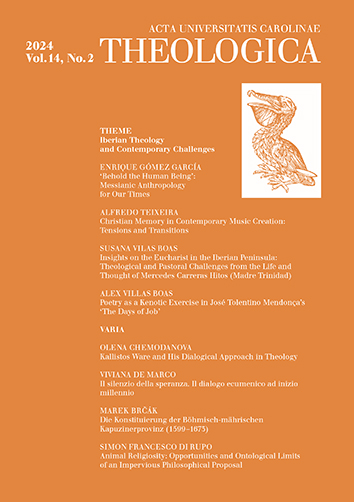AUC Theologica is a peer-reviewed journal for theology published twice a year. As we publish original papers in English, German, French, and Italian, our mission is to serve as a platform both for Czech researchers, who can present their research results in these languages, and for international contributors, who are invited to enter the academic theological discussion in the heart of Europe.
The journal focuses on a wide range of theological disciplines, such as systematic theology, biblical studies, patristic studies, pastoral and spiritual theology, religious education, church history, etc. Within these fields, the journal seeks to reflect the current theological questions and problems, which often requires interdisciplinary approaches. Supporting the intersection of various theological disciplines, we thus also welcome theological papers touching other academic fields including philosophy, sociology, literary studies, and science.
Each issue consists of two sections. The thematic section presents papers of the same focus. The section called ‘Varia’ invites papers dealing with various theological themes from the perspective of all Christian traditions. Our current and past issues are approachable for free on this website in the form of Open Access.
AUC THEOLOGICA, Vol 5 No 2 (2015), 289–302
Církevní nauka o víře a mravech a 2. vatikánský koncil
[The Teaching of the Church on Faith and Morals and the Second Vatican Council]
Libor Ovečka
DOI: https://doi.org/10.14712/23363398.2015.79
published online: 02. 12. 2015
abstract
According to the declaration of the First Vatican Council, the ex cathedra teaching of the pope and of the Church’s magisterium on the matters of faith and morals is infallible. The difference between the matters of faith and morals has not been explained, but in the matters of morals no infallible document has ever been issued laying claim of being infallible and unchangeable. On the contrary, the moral teaching of the Church is developing. The Second Vatican Council returned to the matter by introducing the concept of authentic teaching, which is an official teaching of the Church but without the demand of being unchangeable. All declarations about morality and all moral norms fall into this category. They are bound with the historical, cultural and social situation to the extent that it cannot be maintained that they will be valid forever and under all circumstances in the same way as now if this situation changes.
keywords: First Vatican Council; Second Vatican Council II; Church Doctrine; Development; Infallibility; Authentic Teaching; Conscience; Situational Conditioning of Moral Norms

Církevní nauka o víře a mravech a 2. vatikánský koncil is licensed under a Creative Commons Attribution 4.0 International License.
148 x 210 mm
periodicity: 2 x per year
print price: 100 czk
ISSN: 1804-5588
E-ISSN: 2336-3398
